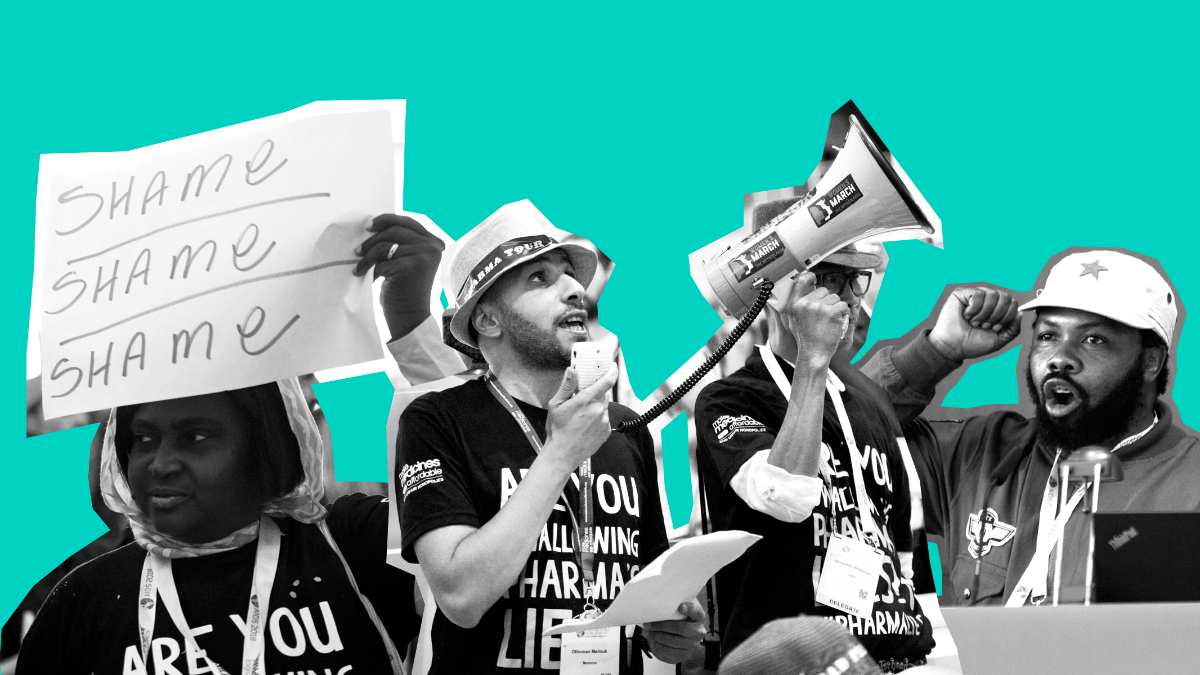- Last week, World Trade Organization (WTO) members and the G7 both held meetings. Discussions included possible solutions on how to vaccinate the world.
- Solutions already exist, but some richer countries – the same ones which have bought more than their fair share of vaccine doses – are continuing to be slow to act, and have waited this long to offer ‘donations’.
- While all actions that increase the rollout of vaccines is welcome, it must not detract from the systemic issues. Othoman Mellouk, Make Medicines Affordable’s campaign lead responds.

The World Trade Organization (WTO) Council met 8-9 June to discuss the waiver proposal, first submitted on 2 October 2020 by India and South Africa, which would waive IP rights on COVID-19 vaccines and treatments. Following international pressure, led by civil society, WTO members have agreed to move to ‘text-based negotiations’.
During the 47th G7 summit, 11-13 June, world leaders swerved the issue of the waiver, and instead committed a combined 1 billion vaccine doses – of that 613 million are actually part of the new pledge. The World Health Organization (WHO) estimates global need to be closer to 11 billion doses – and ‘charity’ is the not the answer.
“An unconscionable injustice”
Othoman Mellouk, MMA campaign lead and ITPC’s Access to Medicines lead said, on the WTO:
“The WTO moving onto text-based negotiations for the TRIPS waiver is a positive development and certainly a step in the right direction. But, it has been eight months since representatives from India and South Africa proposed waiving intellectual property rights on coronavirus vaccines and technologies. It is an unconscionable injustice that we’re set to endure at least another month of negotiations when the global pandemic has already killed over 3.8 million people, the majority of which died after the proposal was submitted in October 2020.
The waiver’s text as proposed by India and South Africa is the minimum required in order to end the pandemic in the next 12-18 months. It is frankly outrageous that EU members and the UK continue to block the waiver, despite both being at advanced stages of their own vaccine rollouts, while many countries around the world have barely started. It is therefore vital that countries like the United States, Canada and Australia fend off pressure from the pharmaceutical industry to ‘water down’ the waiver and come out in support of the full-text as it was first proposed.
Allowing multinational pharmaceutical corporations to continue to control the global supply of COVID-19 vaccines is a death sentence for millions of people around the world – particularly those in low and middle income countries. We only need to look at the cases of HIV, TB, cancer and many other communicable and non-communicable diseases, that to this day cause millions of preventable deaths due to the greed of pharmaceutical corporations and inaction from WTO members.
If a temporary waiver to the World Trade Organization’s TRIPS Agreement continues to be delayed, the global community will have no choice but to push for all essential medicines, vaccines and health technologies to be excluded from what is quickly becoming the world’s worst international agreement. We all have a right to survive. Our health should not be second to pharma corporations wealth.”
“Charity is not a long-term solution”
Commenting on the G7 pledge, Mellouk said:
“Media headlines are reporting a pledge by the G7 of one billion vaccine doses. Of these, 613 million doses are actually part of the new pledge. It falls woefully short of the 11 billion doses required, as estimated by the World Health Organization. COVAX was founded in April 2020 to ensure an equitable rollout worldwide – this has not happened.
Instead, rich countries have put themselves before others. A pandemic is, by definition, global, and in order to tackle it effectively there is no room for nationalistic decisions, which appeal more to voters than to common sense. These donated doses must not become a distraction from the decision that WTO needs to make – approving the TRIPS waiver – quickly and in full.
The pledge is not enough, and ‘charity’ cannot be an effective long-term solution. If the waiver is agreed, the technological know-how can be shared with more manufacturers to help build a sustainable response to this pandemic, including a demand for boosters which is expected to develop. There are many capable, quality-assured generic manufacturers around the world that are ready and waiting to receive the go-ahead to help increase supply.
The slow global reaction of many rich world leaders to support the waiver, while simultaneously hoarding vaccines nationally, has highlighted the flaws in an already failed patent system. Profit-led pharmaceutical companies will not voluntarily relinquish monopolies and the future potential for “bumper” profits that come with retaining control.
The world needs a united, sustainable response – with all available measures enacted to prevent further avoidable deaths – and it needs it now.”




